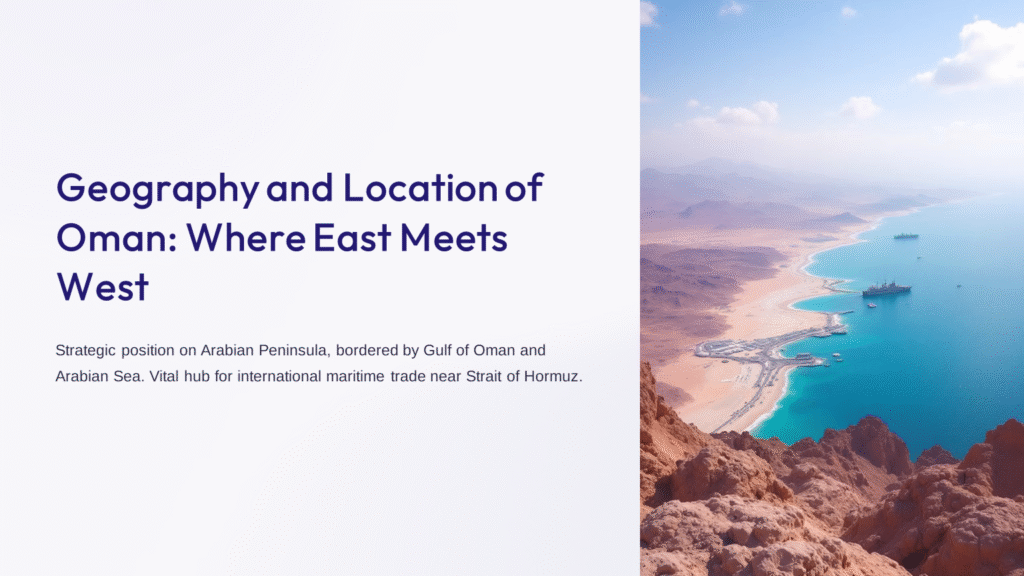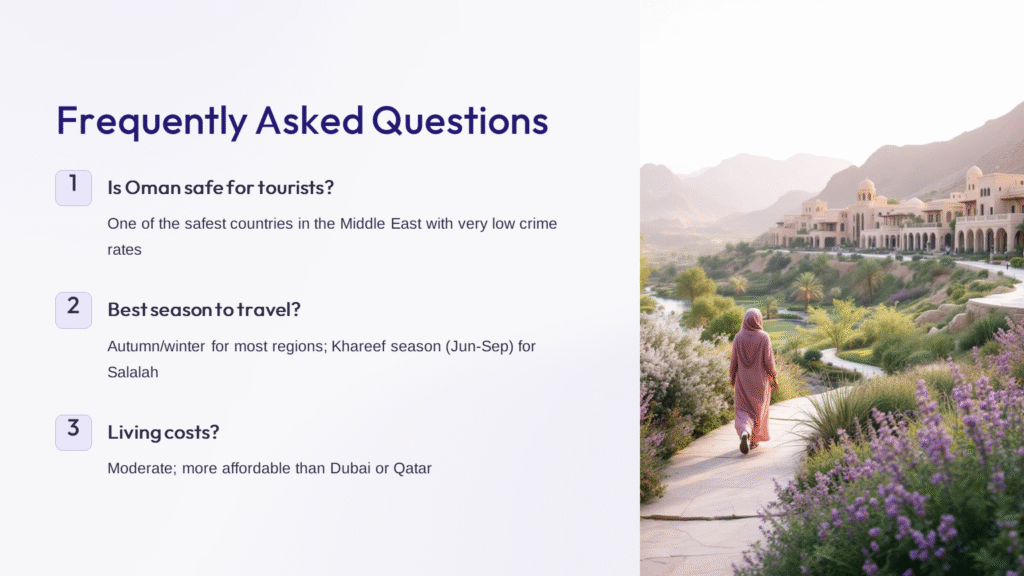introduction Oman, always comes with an image of balance between tradition and modernity—a country stretched along the warm waters of the Arabian Sea and the Gulf of Oman, which has taken a unique development path, distinct from many of its Middle Eastern neighbors. Oman stands out not only for its strategic geographical location, but also for its rich historical legacy, evolving economic structure, and multicultural society. This article presents a precise, professional, and human-centered overview of Oman based on globally trusted sources and on-the-ground experience.
Summary Table: Key Facts About Oman
Topic | Key Details |
Geographic Location | Southeastern Arabian Peninsula, overlooking the Arabian Sea and Gulf of Oman |
Population | Approximately 4.5 million (2024 estimate); high percentage of expatriates |
Religion and Language | Ibadi Islam is the main religion; official language is Arabic; English is widely spoken as a second language |
Economic Structure | Diversified economy: oil, gas, tourism, logistics, and agriculture |
Tourist Attractions | Deserts, pristine beaches, mountains, historical forts, and Salalah during Khareef season |

Introducing Oman
Geography and Location of Oman: Where East Meets West
Oman is located in the southeastern part of the Arabian Peninsula, bordered by the Gulf of Oman to the north and the Arabian Sea to the east. Its strategic position near the Strait of Hormuz makes it a vital hub for international maritime trade. My personal trip to the shores of Sur revealed how the fusion of turquoise sea and golden desert creates a rare and breathtaking natural landscape.
Population and Society: Life in Modern Omani Culture
According to World Bank estimates, Oman’s population in 2024 is approximately 4.5 million, with over 40% made up of expatriates. The official language is Arabic, but English is widely spoken in business and education. One of the unique features of Omani society is its majority adherence to the Ibadi sect — a moderate and lesser-known branch of Islam that fosters peaceful coexistence in the country.
History and Cultural Heritage of Oman: A Timeless Land
Oman is one of the oldest independent nations in the Arab world. According to Britannica, it has a long history of seafaring and trade with India and East Africa. During my visit to Bahla Fort, I realized that such structures are not just historical monuments but also living representations of Arab architectural aesthetics and defensive strategies.
Economy and Fiscal Policy: How Oman Balances Growth
In recent years, Oman has made efforts to diversify its economy beyond oil dependence. According to the IMF, non-oil revenue reached 35% of total income in 2023. One significant reform is the introduction of personal income tax for the first time in the country’s history, set to be implemented in 2028. In my opinion, this could lay the foundation for a more sustainable fiscal structure.
Tourism and Natural Attractions: From Deserts to Coastlines
From Salalah’s cool monsoon rains during the Khareef season to the majestic Hajar Mountains and the vast Empty Quarter desert, Oman offers immense natural diversity. My experience in Wadi Bani Khalid proved that eco-tourism infrastructure is well-developed without harming the environment. Projects like “Green Mountain” are also underway to attract visitors to the cooler highlands.
Politics and Stability: Is Oman Safe for Expats
Compared to its neighbors, Oman maintains a neutral foreign policy. Its role as a mediator in regional crises — such as the conflict in Yemen or tensions between Iran and the West — has drawn international attention. In addition, infrastructure developments like Duqm Port and international airports have boosted the country’s transit capacity.
read more:

Why Is Oman a Better Immigration Destination in 2025
Key Criteria That Make Oman Ideal for Investment, Immigration, and Business Development
After six months of research and thorough evaluation, we selected Oman as a strategic destination for business expansion. Here are several key reasons behind this decision:
Economic and Political Stability
Oman is one of the safest and most stable countries in the Gulf region, offering a secure environment for long-term investment.
Transparent and Simple Business Laws
Company registration in Oman is carried out through clear legal procedures with minimal complexity, and even allows full ownership for foreign investors.
Reasonable Costs and Tax Benefits
Living and doing business in Oman is more affordable than in many other countries in the region, with attractive tax incentives.
Broad Economic Opportunities
Oman is a growing market with easy access to Arab countries, Africa, and South Asia, making it a strategic gateway for trade.
High Quality of Life
Pristine nature, social security, a welcoming culture, and modern amenities make Oman a desirable place to live and work.
At Flamingo Institute, with over 5 years of experience in international company formation, we are here to help you navigate your immigration and business setup journey in Oman—quickly and with minimal challenges.

Summary Table
Section | Key Highlights |
Geography | A unique blend of desert, sea, and mountains with a strategic location near the Strait of Hormuz |
Society | Cultural diversity, high expatriate population, Ibadi Islam as the dominant sect |
History | Rich maritime heritage, historic fort architecture, long-standing independence |
Economy | Economic diversification, fiscal reforms, introduction of income tax by 2028 |
Tourism | Unique natural landscapes, sustainable development projects, growing tourism sector |
Politics | Neutral diplomacy, mediator role in the region, development of transport and logistics infrastructure |
Frequently Asked Questions (FAQ)
- Is Oman a safe destination for tourists?
Yes, Oman is considered one of the safest countries in the Middle East, with very low crime rates. - What is the best season to travel to Oman?
Autumn and winter are ideal for most regions, while the Khareef season (June to September) is best for visiting Salalah. - Do Iranians need a visa to travel to Oman?
Yes, but an electronic visa (eVisa) is available and can be obtained easily under simplified conditions. - Is Oman an expensive country to live in?
Living costs are moderate. Compared to Dubai or Qatar, Oman is more affordable. - How is internet and digital infrastructure in Oman?
Oman has extensive 4G coverage and offers advanced e-government services across the country.

